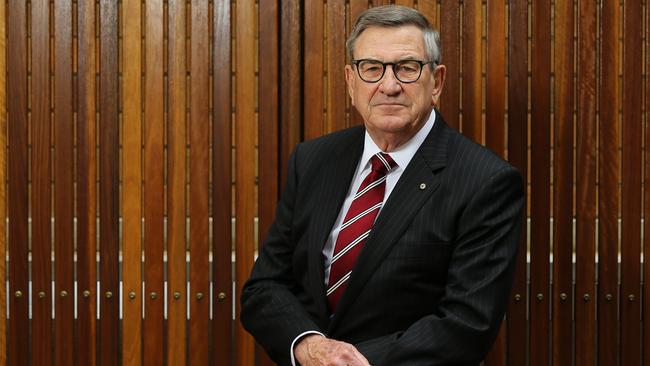Exports under threat as China looks elsewhere
The assumption that Australia’s iron ore will be untouchable in trade tensions with China may be wrong, warns ex-Huawei boss.

The former chairman of Huawei Australia, John Lord, has warned that this country’s $150bn-a-year export trade with China is vulnerable to a long-term shift by Beijing away from Australian exports, including iron ore, if political relations continued to deteriorate.
“What concerns me is the trend by China to look for alternate sources of supply,” Mr Lord told The Weekend Australian.
“The Chinese government always thinks long-term.
“We are all working on the assumption that iron ore will be untouchable and that they will have to buy our iron ore forever. But that may not be the case.”
Mr Lord, a former rear admiral in the Royal Australian Navy who stepped down as Huawei Australia chair in March after nine years in the role, noted moves by China to build some berths at its ports that would be better able to receive more iron ore from Brazil in the longer term.
He said there were also other sectors such as service and medical industries that “had been primed to go into China” that were vulnerable to Beijing directing its business elsewhere.
China had also bought more barley from the US as it imposed tariffs of up to 80 per cent on imports of Australian barley in May.
Mr Lord’s comments follow further indications from China this week that it was taking a more critical look at the potential for weeds and pests in grain imports from Australia.
The grain industry was scrambling this week to interpret a statement from China’s General Administration of Customs that it would be applying “enhanced inspection” to imports of Australian wheat and barley.
Grain Growers chairman and Victorian wheat farmer Brett Hosking told The Weekend Australian it was not clear if the comments were meant to apply mainly to barley exports to China, which had all but dried up following the imposition of tariffs, or if it was also meant to apply to Australia’s $280m-a-year wheat trade with China.
“We think it relates more to barley than it does to wheat,” he said. But he said wheat farmers needed to be extra vigilant on checking the grain they sent to China.
He said the latest announcement was “disappointing from a growers’ point of view”, and added: “We have had a really good, strong trading relationship with China which seems to have soured at the moment.”
Australia’s barley exports to China once hit a record of more than $1.3bn a year before the imposition of the tariffs. Most of the barley was going to produce malt for Chinese beer. The Australian grains industry had submitted an appeal against the tariff hit.
The barley trade was dealt another blow this month when Chinese customs officials suspended barley imports from West Australian grain handling co-operative and Australia’s largest grain exporter, CBH. Chinese authorities alleged they had found pests in a shipment of barley from the co-operative.
With barley exports from Australia now almost non-existent, China has recently turned to the US and Argentina for its imports.
In a report issued this week, the Australia China Relations Institute warned that China had the potential to inflict even more trade damage to Australia if it decided to step up trade retaliation for political means.
Very concerned for Australian business
Mr Lord said it was not easy for Australian exporters to find new markets to replace their trade with China in the short term.
“I am very concerned for Australian business in the future,” he said. “We cannot just change trading partners in many industries in a short time frame. There is some naivety in some of our strategic policy making that doesn’t understand that business cannot change direction overnight.”
Mr Lord said he expected that Australia’s iron ore trade with China, the biggest single element of its export trade, would remain strong for the next three to five years.
But he said Australia needed to be aware that Beijing took a long-term approach to diversifying its sources of supply, including potentially buying more agricultural products from the US to replace some Australian exports. He said it was important Australia kept up a dialogue with China despite political differences.
Mr Lord, whose former company was hit by the decision by the Gillard government to ban Huawei from supplying equipment for the National Broadband Network and the Turnbull government’s move to ban it from suppling equipment for Australia’s 5G network, said he was concerned Australia’s export potential was being harmed by its worsening relationship with China at a time when it badly needed revenue to reduce its debts incurred as a result of the pandemic.
“We have to understand the sensitivities (of dealing with China) because Australia is a trading country. It is not like America which can stand alone,” he said. “We now have this big debt to pay back as a result of the pandemic.
“We need our trade to be solid for the foreseeable future.”
Mr Lord said he believed that some elements in Australia were being “wound up” by US interests to maintain strong criticism of China.
He said Australia needed to learn to make some of its critical points with China in more diplomatic ways.








To join the conversation, please log in. Don't have an account? Register
Join the conversation, you are commenting as Logout